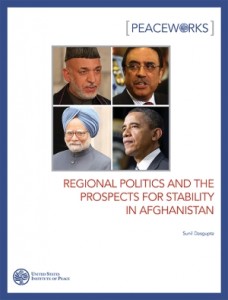Published:
April 29, 2013
By: Sunil Dasgupta
The United States is planning its withdrawal from Afghanistan as the country faces three interrelated challenges: a weak national state, rising Islamic radicalism based in Pakistan’s tribal belt, and zero-sum regional politics. The stage is set for a balance-of-power contest between India and Pakistan played out in Afghanistan that could fuel another civil war in the country. This report details the nature of the tension between India and Pakistan over Afghanistan and outlines steps that the U.S. government can take to avoid another conflict there.
 Summary
Summary
As the United States plans its withdrawal from Afghanistan, the country faces three interrelated challenges: a weak national state, rising Islamic radicalism based in Pakistan tribal belt, and zero-sum regional politics. The stage is set for a balance-of-power contest between India and Pakistan played out in Afghanistan that could fuel another civil war in the country.
India has been offering economic and technical assistance to Afghanistan, as it sees trade and investment as primary drivers of international relations. As India grows as a regional power, a consensus has emerged among policymakers and elites that Afghanistan is of strategic importance and India should not cede influence to Pakistan. However, India is reticent to use military force and likely cannot create a political coalition within Afghanistan that could maintain stability there.
Pakistan has a deep connection to Afghanistan stemming from its contiguity, shared ethnic groups, and long-standing support of the Taliban. Islamabad has shown great willingness to pursue military options to achieve its security interests. Expectations that Pakistan will not be able to sustain a military campaign in Afghanistan are incorrect. Growing Indian presence in Afghanistan is likely to reduce the differences between radical groups and the Pakistan Army and give them a common cause to reenergize their alliance.
The U.S. and Afghan governments would prefer to see India and Pakistan work together. India-Pakistan cooperation can be minimal, where India limits its presence to the north while Pakistan has greater influence in the south. But even this minimal cooperation requires sizeable U.S. presence to verify and monitor the activities of the two South Asian rivals in Afghanistan. Maintaining significant U.S. presence in Afghanistan could dampen the India-Pakistan competition in Afghanistan and allow the Kabul government to consolidate.
If the United States does not maintain a meaningful presence in Afghanistan to enable India-Pakistan cooperation, the next best alternative would be for the Obama administration to seek unilateral disengagement with the Indian and Pakistani governments. To this end, Washington could resume its former policy of “de-hyphenation,” whereby the United States and India could pursue long-term bilateral objectives, such as technology transfer, while Pakistan feels more secure with diminished Indian presence in Afghanistan. Unless the conditions underlying the contest between India and Pakistan over Afghanistan change, a new civil war in Afghanistan is all too likely.
ABOUT THE REPORT
The United States is planning its withdrawal from Afghanistan as the country faces three interrelated challenges: a weak national state, rising Islamic radicalism based in Pakistan’s tribal belt, and zero-sum regional politics. The stage is set for a balance-of-power contest between India and Pakistan played out in Afghanistan that could fuel another civil war in the country. This report details the nature of the tension between India and Pakistan over Afghanistan and outlines steps that the U.S. government can take to avoid another conflict there. The author would like to thank Stephen P. Cohen, Moeed Yusuf, and three anonymous reviewers for their comments on earlier drafts.
ABOUT THE AUTHOR
Sunil Dasgupta is director of the University of Maryland Baltimore County’s political science program at the Universities at Shady Grove and a nonresident senior fellow at the Brookings Institution in Washington, DC. He teaches political science, international affairs, and security studies and writes on military strategy, organization, and operations. He is coauthor of Arming without Aiming: India’s Military Modernization and is presently working on a project investigating Chinese and Indian grand strategic approaches.

